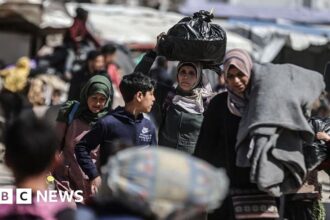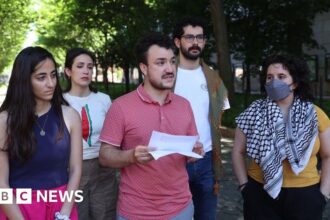As I write these lines, Russian tanks continue to advance into the territory of Ukraine, and emotions threaten to overwhelm me. But emotions can’t shake what we value most as economists: a dedication to truth and the careful, impartial application of facts and logic in order to reach conclusions.
What can we say in this spirit about the top five economic threats that arise from the war Russia is waging against Ukraine, particularly from the perspective of a small, but historically and strategically important regional player, Georgia?
PRICES – FUEL, GRAIN, FOOD STAPLES and Commodities
Prices will be the first economic casualty, especially fuel prices and staple foods: wheat, corn and cooking oil.
Oil and Gas
Brent Crude Oil prices have risen to their highest levels since 2014. In recent days the price has risen above $100 per barrel. Comparatively, the price of a barrel was around $80 at the start of 2022. This spike is driven by a large global gap between demand and supply due to the pandemic and, on another hand, the geopolitical danger, as Russia is the world’s third largest oil producer. Russia supplies a tenth of the world’s oil consumption and nearly half of Europe‘s gas.
Food staples
Both Russia and Ukraine export important agricultural commodities to the world. According to data from the year 2020, Russia and Ukraine together accounted for 26% global wheat exports with Ukraine accounting for 8%. (Not surprisingly, Chicago Wheat Futures rose sharply when the invasion of Ukraine started). Both countries are responsible for 24% global barley exports, 57% of world exports of cottonseed, sunflower seed and safflower oil. Ukraine accounts for 13% the world’s exports of corn. The majority of Ukraine’s grain is exported to Asia and Africa, putting food safety in these regions at risk.
Georgia: Implications
It is important to remember that global food prices rose rapidly even before the war began due to the Covid-19 Pandemic, and the strains it put on the global production and supply chain (the FAO reported a 28 percent increase in food prices in 2021). The war will only exacerbate the situation. Georgia imports wheat for over 90% of its needs (most of which comes from Russia), so the increase in global prices will have a direct impact on the country and, more specifically, on the lives of the poor. Fuel prices are already rising in Georgia. The government must begin planning how to ease the impact on its most vulnerable and poorest groups. These measures will almost certainly lead to more borrowing from abroad, which brings us onto the second set.
FINANCIAL MARKETS ARE FACED WITH UNCERTAINTY. ECONOMIC REBORN FROM COVID IS UNCERTAIN.
The financial markets are not yet ready to price in the potential risks of this war. Morgan-Stanley’s investment chief warned against short-term trading in the conflict. This means that the financial markets may still experience wild swings in the future, which will increase borrowing costs and slow down global growth. Bloomberg Analytics warns that the growth rate will slow down as households spend a larger share of their incomes on food and fuel. This leaves fewer resources to make other purchases.
Increased uncertainty on global financial markets may also mean higher borrowing costs for Georgia. It is important to remember that most of Georgia’s multilateral debt is low-interest debt owed to international organizations. Georgia will not be affected by the rising costs of borrowing on international markets. Georgia’s investment, and FDI, may be affected, as the geopolitical uncertainty in the region increases. If the value of the Georgian Lari declines, the ratio of debt to GDP will likely increase.
IMPORTS FROM RUSSIAN AND UKRAINIAN PRODUCTS. GEORGIA EXPORTS TO BOTH COUNTRIES
Georgia’s top five export destinations are both Russia and Ukraine. In January 2022, Russia accounted for 12.9% of Georgia’s total exports. The strongest links are not from exports of goods, but rather from services such as tourism. If the situation worsens, tourism in both countries could suffer or even stop.
In terms of imports to Georgia, Russia is responsible for 11% (the second largest share after Turkey), and Ukraine is in seventh place with 4.3%.
REFUGEE CRISIS
The number of refugees from Ukraine will likely reach unprecedented levels. EU countries estimate that over 7 million people may be displaced. Georgia is ready to accept refugees from Ukraine and has a huge public support. As the fighting continues in the North East and South of Ukraine, it is almost impossible to physically reach Georgia by land, air or sea. The majority of refugees are now at the western borders. They have been taken in by Poland. Slovakia. Romania.
GEORGIA’S PERSPECTIVE: ANTICIPATION of what might be next
The anticipation of what might happen next is perhaps the most terrifying aspect of this war, especially if we allow the most pessimistic scenarios to unfold. Even if Georgia behaves “cautiously”, i.e. does not join the global sanctions against Russia or avoids inflammatory language, it is unlikely that Georgia will escape the imperialist game. Georgia’s situation is well known to other countries, and if worst comes to worse, international investments and FDI will likely dry up.
The question that economics alone can’t answer is: Is the world (including Georgia), prepared to pay the cost of this war? Will the world continue to support Ukraine’s struggle for independent, or will it prefer peace at all costs with Russia? Georgians and Ukrainians often say that if today you give up your freedom for bread, tomorrow you won’t have any bread and no freedom.
I think that the recent events in Georgia and Ukraine have shown the people of these countries their desire for freedom, both now and in the future. I can only hope that other countries will be able to follow their lead.
A Note from ISET’s Director Tamar Sulukhia : Ukraine inspires a better world
ISET is a think-tank for economic policy. It writes about economics. We also want to say today how much we admire Ukraine and its heroism. Ukraine has become an example of a shining beacon. Ukraine’s fight against Russian aggression is now a noble and heroic fight for the highest human values. It has become a phenomenon that inspires the entire civilized globe.
Ukraine, despite its tragic situation, has given humanity a chance to improve. First, it inspired unprecedented solidarity across the globe. Big and small countries, global institutions, and international organizations are all working together to isolate the aggressor and provide military, humanitarian, financial, and other support to Ukraine. Second, it reminds global community that it is never too early to confront violence and aggression. The world cannot afford to make the same mistakes as in the past.
Every night in Tbilisi, Rustaveli Ave is filled with people protesting Russian aggression. They also show their admiration and solidarity for our Ukrainian allies and Georgia’s commitment to the EU and European Values. We are pleased to see that Europe has opened its door to Ukraine and we believe that our country will soon join the European family.
BY YASYA BABYCH FOR ISET
Read More @ georgiatoday.ge













